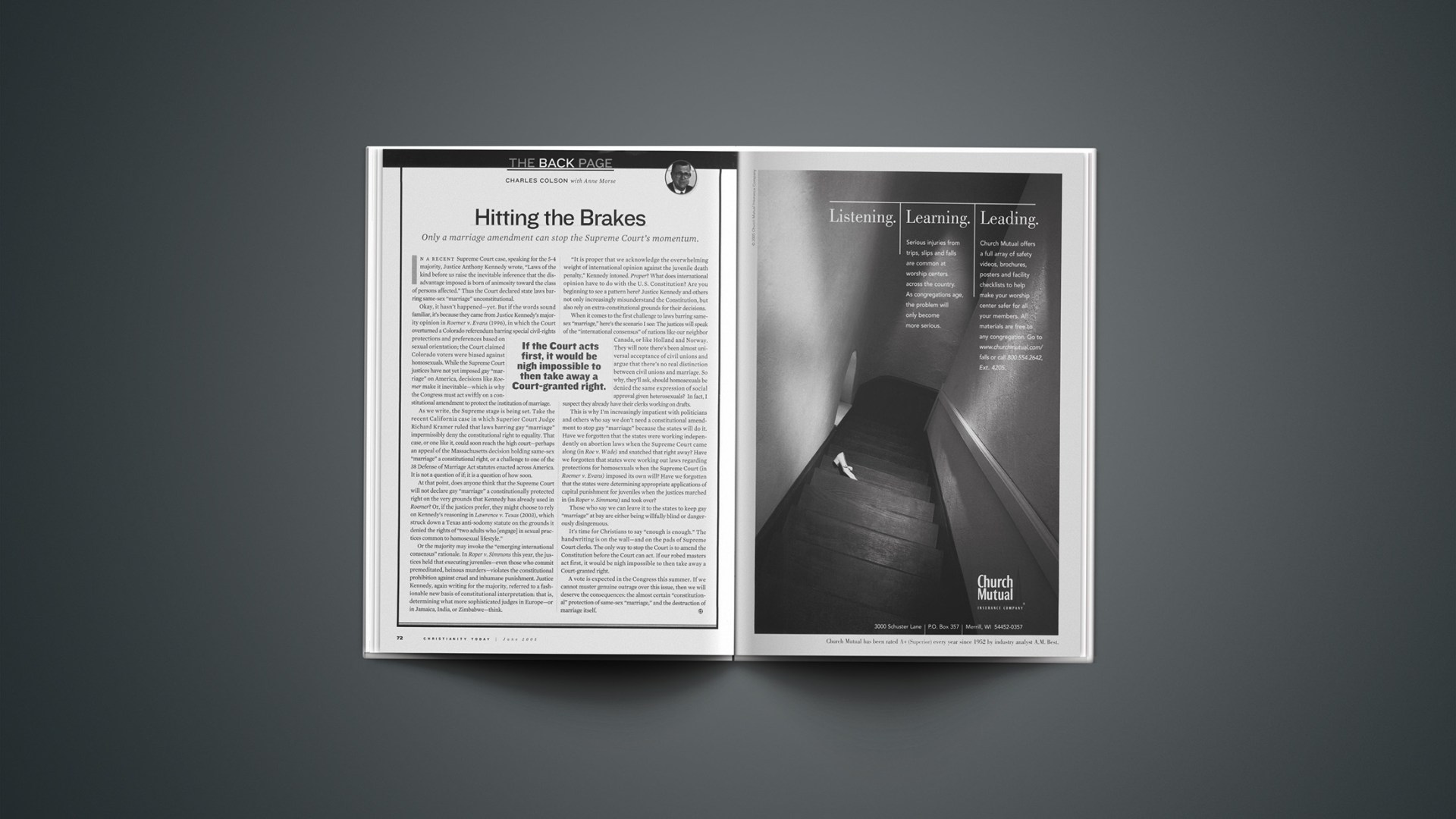In a recent Supreme Court case, speaking for the 5-4 majority, Justice Anthony Kennedy wrote, “Laws of the kind before us raise the inevitable inference that the disadvantage imposed is born of animosity toward the class of persons affected.” Thus the Court declared state laws barring same-sex “marriage” unconstitutional.
Okay, it hasn’t happened—yet. But if the words sound familiar, it’s because they came from Justice Kennedy’s majority opinion in Roemer v. Evans (1996), in which the Court overturned a Colorado referendum barring special civil-rights protections and preferences based on sexual orientation; the Court claimed Colorado voters were biased against homosexuals. While the Supreme Court justices have not yet imposed gay “marriage” on America, decisions like Roemer make it inevitable—which is why the Congress must act swiftly on a constitutional amendment to protect the institution of marriage.
As we write, the Supreme stage is being set. Take the recent California case in which Superior Court Judge Richard Kramer ruled that laws barring gay “marriage” impermissibly deny the constitutional right to equality. That case, or one like it, could soon reach the high court—perhaps an appeal of the Massachusetts decision holding same-sex “marriage” a constitutional right, or a challenge to one of the 38 Defense of Marriage Act statutes enacted across America. It is not a question of if; it is a question of how soon.
At that point, does anyone think that the Supreme Court will not declare gay “marriage” a constitutionally protected right on the very grounds that Kennedy has already used in Roemer? Or, if the justices prefer, they might choose to rely on Kennedy’s reasoning in Lawrence v. Texas (2003), which struck down a Texas anti-sodomy statute on the grounds it denied the rights of “two adults who [engage] in sexual practices common to homosexual lifestyle.”
Or the majority may invoke the “emerging international consensus” rationale. In Roper v. Simmons this year, the justices held that executing juveniles—even those who commit premeditated, heinous murders—violates the constitutional prohibition against cruel and inhumane punishment. Justice Kennedy, again writing for the majority, referred to a fashionable new basis of constitutional interpretation: that is, determining what more sophisticated judges in Europe—or in Jamaica, India, or Zimbabwe—think.
“It is proper that we acknowledge the overwhelming weight of international opinion against the juvenile death penalty,” Kennedy intoned. Proper? What does international opinion have to do with the U.S. Constitution? Are you beginning to see a pattern here? Justice Kennedy and others not only increasingly misunderstand the Constitution, but also rely on extra-constitutional grounds for their decisions.
When it comes to the first challenge to laws barring same-sex “marriage,” here’s the scenario I see: The justices will speak of the “international consensus” of nations like our neighbor Canada, or like Holland and Norway. They will note there’s been almost universal acceptance of civil unions and argue that there’s no real distinction between civil unions and marriage. So why, they’ll ask, should homosexuals be denied the same expression of social approval given heterosexuals? In fact, I suspect they already have their clerks working on drafts.
This is why I’m increasingly impatient with politicians and others who say we don’t need a constitutional amendment to stop gay “marriage” because the states will do it. Have we forgotten that the states were working independently on abortion laws when the Supreme Court came along (in Roe v. Wade) and snatched that right away? Have we forgotten that states were working out laws regarding protections for homosexuals when the Supreme Court (in Roemer v. Evans) imposed its own will? Have we forgotten that the states were determining appropriate applications of capital punishment for juveniles when the justices marched in (in Roper v. Simmons) and took over?
Those who say we can leave it to the states to keep gay “marriage” at bay are either being willfully blind or dangerously disingenuous.
It’s time for Christians to say “enough is enough.” The handwriting is on the wall—and on the pads of Supreme Court clerks. The only way to stop the Court is to amend the Constitution before the Court can act. If our robed masters act first, it would be nigh impossible to then take away a Court-granted right.
A vote is expected in the Congress this summer. If we cannot muster genuine outrage over this issue, then we will deserve the consequences: the almost certain “constitutional” protection of same-sex “marriage,” and the destruction of marriage itself.
Copyright © 2005 Christianity Today. Click for reprint information.










